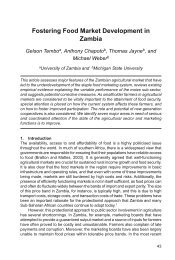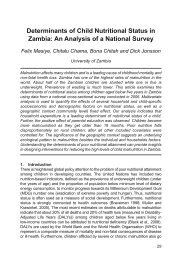Introduction to Basic Legal Citation - access-to-law home
Introduction to Basic Legal Citation - access-to-law home
Introduction to Basic Legal Citation - access-to-law home
You also want an ePaper? Increase the reach of your titles
YUMPU automatically turns print PDFs into web optimized ePapers that Google loves.
implication. In decisions of the Alaska Supreme Court and briefs submitted <strong>to</strong> it, "AS" is<br />
commonly used instead of "Alaska Stat."; in Kentucky it is unders<strong>to</strong>od that "KRS" stands for<br />
"Kentucky Revised Statutes" and not statutes of the state of Kansas. At the extreme, this form<br />
of state-specific citation dialect leaves off all explicit reference <strong>to</strong> the state. A reference in an<br />
Ohio brief <strong>to</strong> "R.C." is unders<strong>to</strong>od as referring <strong>to</strong> Ohio's "Revised Code"; one in a New York<br />
brief <strong>to</strong> a section of the "General Municipal Law" and one in a California brief <strong>to</strong> a section of<br />
the "Penal Code" are unders<strong>to</strong>od as referring <strong>to</strong> the respective state's codified statutes.<br />
§ 2-340. Statute <strong>Citation</strong>s – Variants and Special Cases [BB|ALWD]<br />
§ 2-340(1) Examples<br />
– House Page Board Revision Act of 2007, Pub. L. No. 110-2, 121 Stat. 4.<br />
– House Page Board Revision Act of 2007, Pub. L. No. 110-2,<br />
http://frwebgate.<strong>access</strong>.gpo.gov/cgibin/getdoc.cgi?dbname=110_cong_public_<strong>law</strong>s&docid=f:publ002.110.pdf.<br />
– Health Risk Limits for Perfluorooctanoic Acid and Perfluorooctane Sulfonate, 2007<br />
Minn. Laws ch. 37,<br />
http://ros.leg.mn/bin/getpub.php?type=<strong>law</strong>&year=2007&sn=0&num=37.<br />
Special Case 1 – Session Laws: Don't cite a statute <strong>to</strong> the session <strong>law</strong>s (the compiled<br />
enactments of a legislative body during a particular session) if a codified version will serve<br />
your purposes. This principle confines session <strong>law</strong> citations <strong>to</strong>:<br />
• very recent enactments (provisions not yet codified even in supplements or pocket<br />
parts or online versions),<br />
• enactments that are not codified because they are not of general applicability,<br />
• situations where the reference is <strong>to</strong> enactment itself or <strong>to</strong> provisions that have since<br />
been repealed or modified,<br />
• provisions that are so scattered across the code that a reference <strong>to</strong> the session <strong>law</strong>s is<br />
more efficient, and<br />
• those rare cases in which the language in the codified version differs in some<br />
significant way from the session <strong>law</strong>s.<br />
A session <strong>law</strong> reference consists of: the name of the statute (or if not named "Act of [date]"),<br />
its public <strong>law</strong> number ("Pub. L. No.") or equivalent state designation, and the source. In the<br />
case of a recent enactment this will most likely be electronic. See § 2-110. Where a print<br />
source is used the reference consists of a volume or year number followed by the name of the<br />
publication, abbreviated ("Stat." or "U.S.C.C.A.N." in the case of a federal act) and a page<br />
number. The year of enactment, in parentheses, is included in cases where that information is<br />
not already part of one of the other citation components.<br />
¡But see § 2-335!<br />
29




